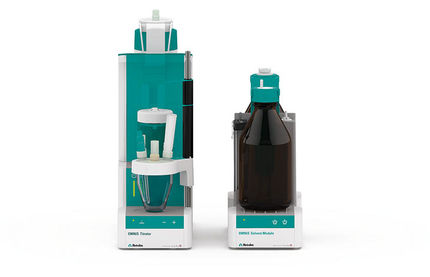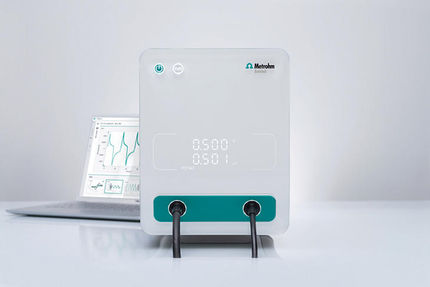To use all functions of this page, please activate cookies in your browser.
my.chemeurope.com
With an accout for my.chemeurope.com you can always see everything at a glance – and you can configure your own website and individual newsletter.
- My watch list
- My saved searches
- My saved topics
- My newsletter
Donepezil
Donepezil, marketed under the trade name Aricept (Eisai), is a centrally acting reversible acetylcholinesterase inhibitor. Its main therapeutic use is in the treatment of Alzheimer's disease where it is used to increase cortical acetylcholine. It has an oral bioavailability of 100% and easily crosses the blood-brain barrier. Because it has a half life of about 70 hours, it can be taken once a day. Initial dose is 5 mg per day, which can be increased to 10 mg per day after an adjustment period of at least 4 weeks. Product highlight
Studies in Alzheimer's diseaseCurrently, there is no definitive proof that use of donepezil or other similar agents alters the course or progression of Alzheimer's disease. However, 6-12 month controlled studies have shown modest benefits in cognition and/or behavior. Pilot studies have reported that donepezil therapy may potentially have effects on markers of disease progression, such as hippocampal volume. Therefore, many neurologists, psychiatrists, and primary care physicians use donepezil in patients with Alzheimer's disease. In 2005, the UK National Institute for Clinical Excellence (NICE) withdrew its recommendation for use of the drug for mild-to-moderate AD, on the basis that there is no significant improvement in functional outcome; of quality of life or of behavioral symptoms. However, NICE revised its guidelines to suggest that donepezil be used in moderate stage patients for whom the evidence is strongest.[1] While the drug is currently indicated for mild to moderate Alzheimer's, there is also evidence from 2 trials that it may be effective for moderate to severe disease. An example of this is a Karolinska Institute paper published in The Lancet in early 2006, which states that donepezil improves cognitive function even in patients with severe Alzheimer's disease symptoms. [2] CombinationsDonepezil is sometimes used in combination with memantine, a newer agent for Alzheimer's disease, as the response to both together is considered superior to donepezil alone. In moderate to severe Alzheimer's, a controlled clinical trial has shown that the addition of Memantine to stable donepezil therapy improves cognition, functioning and behavior. Uses for other conditionsDonepezil has been tested in other cognitive disorders including Lewy body dementia and Vascular dementia, but it is not currently approved for these indications. Donepezil has also been studied in patients with Mild Cognitive Impairment, schizophrenia, attention deficit disorder, post-coronary bypass cognitive impairment, cognitive impairment associated with multiple sclerosis, and Down syndrome. A 3 year NIH trial in patients with mild cognitive impairment reported that donepezil was superior to placebo in delaying rate of progression to dementia during the initial 18 months of the study but this was not sustained at 36 months. In a secondary analyses, a subgroup of individuals with the Apolipoprotein E4 genotype showed sustained benefits with donepezil throughout the study. However at this time donepezil is not indicated for prevention of dementia. Relationship to class and placeboDonepezil is generally better tolerated than others in its class, simpler to use, and the agent with the most number of well controlled clinical trials. Common side effects include bradycardia, nausea, diarrhea, anorexia, abdominal pain, and vivid dreams. In 2006, Eisai, the manufacturer issued a statement that a single vascular dementia study found a difference in the percent of study participants who died in the donepezil group (1.7%) versus the placebo group (0%) and that this could be due to an unusually low death rate on the placebo group. An analysis of all three Vascular Dementia trials, according to Eisai, "shows no statistically significant differences in observed mortality rates between the donepezil and placebo groups (1.7% vs. 1.1%)". Pilot studyIn July 2002, a pilot study, reported that donepezil improves the memory of aging pilots. The researchers trained pilots in a flight simulator to perform specific maneuvers and to respond to emergencies that developed during their mock flight, after giving half the pilots donepezil and half a placebo. One month later they retested the pilots and found that those who had taken the donepezil remembered their training better, as shown by improved performance.[3] However, several other studies in normal older adults (before and after the above study) have not shown any significant cognitive improvements or shown inconsistent findings.[citation needed] References
Categories: Anticholinesterases | Antidementia agents |
|||||||||||||||||||||||||||||||||||||||||||||||||||||||||||
| This article is licensed under the GNU Free Documentation License. It uses material from the Wikipedia article "Donepezil". A list of authors is available in Wikipedia. | |||||||||||||||||||||||||||||||||||||||||||||||||||||||||||
- Efficient Elemental Analysis (CHNSO) - Using Microbalances for Accurate Sample Preparation
- Waters Corporation to Assist US EPA in the Analysis of Perfluorinated Compounds (PFCs) in Soil and Water - Latest CRADA Aimed at Developing Liquid Chromatography and Mass Spectrometry Methods for Measuring PFCs at Very Low Concentrations







